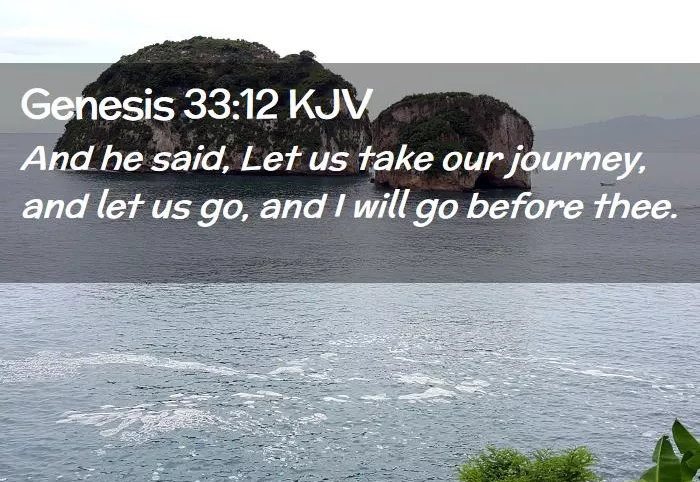Read the Daily Bible Verse – Genesis 33:12 To Strengthen Your Spiritual Journey.
The Book of Genesis, the first book of the Bible, lays the foundation for the narrative of God‘s creation, the early patriarchs, and the establishment of Israel. Chapter 33 specifically captures a pivotal moment in the lives of two brothers, Jacob and Esau, after years of estrangement. The backdrop of this chapter is laden with themes of reconciliation, forgiveness, and the complexities of familial relationships.
Historical Background
To understand Genesis 33:12, one must consider the history of Jacob and Esau. Jacob, the younger twin, had previously deceived his father Isaac into giving him the blessing intended for Esau, the elder brother. This act of trickery led to a deep rift between the siblings, prompting Jacob to flee to his mother’s family to escape Esau’s wrath (Genesis 27). Years later, having lived in Haran and undergone personal transformations, Jacob returns to Canaan, anxious about confronting his brother.
The Reunion
Genesis 33 describes their reunion. Upon Jacob’s return, he learns that Esau is approaching with 400 men, which amplifies his fears. However, the encounter turns unexpectedly warm, as Esau runs to Jacob, embraces him, and kisses him. This moment of reconciliation is crucial, demonstrating themes of grace and forgiveness.
The Genesis 33:12 Meaning
Analyzing the Verse
Genesis 33:12 (KJV) reads: “And he said, Let us take our journey, and let us go, and I will go before thee.” This statement, made by Esau to Jacob, signifies a desire for companionship and support on the journey ahead. It suggests a shift in their relationship from conflict to camaraderie.
Thematic Significance
The essence of this verse lies in the invitation to journey together, symbolizing the possibility of restored relationships and a new beginning. Esau’s willingness to lead Jacob underscores a role reversal from their earlier years of rivalry and competition. It illustrates the profound impact of forgiveness and the potential for healing in fractured relationships.
Genesis 33:12 Application in Life
Personal Reflection
In today’s context, Genesis 33:12 offers valuable lessons in humility and reconciliation. The act of inviting someone to join in a journey reflects a commitment to unity, emphasizing that personal relationships require ongoing effort and openness.
Practical Steps
Embrace Forgiveness: Just as Esau forgives Jacob, we are called to extend grace to those who have wronged us. Holding onto grudges can hinder personal growth and relationships.
Initiate Dialogue: Open communication can pave the way for healing. Like Esau’s invitation to Jacob, reaching out can help mend broken connections.
Value Relationships: Prioritizing relationships over past grievances can lead to deeper bonds. The journey together symbolizes a shared future, urging us to work towards common goals with those we care about.
Comparison with Other Biblical Texts
Parallels in Scripture
The themes found in Genesis 33:12 resonate throughout the Bible. One notable comparison is the story of the Prodigal Son in Luke 15:11-32. Just as Esau embraces Jacob, the father in the parable embraces his wayward son, symbolizing unconditional love and forgiveness.
The Role of Forgiveness
Both narratives emphasize that forgiveness can lead to healing and restoration. The journey in Genesis parallels the journey of faith depicted in many New Testament writings, where reconciliation and grace are central themes.
Conflict Resolution
Proverbs 17:14 states, “The beginning of strife is as when one letteth out water: therefore leave off contention, before it be meddled with.” This reflects the proactive approach taken by Esau, urging believers to seek resolution before conflicts escalate.
Modern-Day Relevance
Cultural Reflection
In a world rife with division and conflict, Genesis 33:12 serves as a reminder of the power of reconciliation. As societal tensions rise, the call to unity is more critical than ever. The verse invites individuals and communities to seek common ground, fostering relationships that can withstand challenges.
Community and Relationships
Church communities can draw from this narrative to address conflicts within congregations. The act of journeying together, as Esau proposes, encourages collaboration and mutual support in faith communities.
Personal Growth
On a personal level, this verse can inspire individuals to take proactive steps in healing relationships. The acknowledgment of past wounds is essential, but so is the willingness to move forward together.
Conclusion
Genesis 33:12 encapsulates a profound message of reconciliation, forgiveness, and the importance of relationships. The transition from estrangement to companionship in this verse serves as a powerful reminder that, despite past grievances, there is always a path toward healing.
A Call to Action
As we reflect on Esau’s invitation to Jacob, let us consider how we can extend similar invitations in our lives. Whether it be in our families, friendships, or communities, the willingness to journey together fosters unity and growth.
Final Thoughts
In a time when division often overshadows connection, Genesis 33:12 reminds us that healing is possible. By embracing forgiveness and the journey of life together, we can create a more compassionate and understanding world. Let us take this lesson to heart, striving to be instruments of peace and reconciliation in our daily lives.
Genesis 33:12 Commentary
In closing, Genesis 33:12 serves not only as a historical account but also as a timeless lesson in human relationships. It encourages us to reflect on our own journeys, urging us to embrace forgiveness and the possibilities that arise when we choose to reconcile. The biblical narrative teaches us that while conflict may arise, the opportunity for redemption and restored relationships is always within reach, urging us to take that step toward healing.
Related topics:


